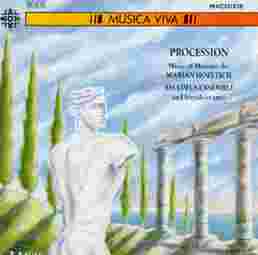
with:
Erica goodman: harp
Joseph Petric: free-bass accordion
Raymond Luedeke: clarinet
James McKay: bassoon
Joan watson: horn
Music of Marjan Mozetich
with:
Erica goodman: harp
Joseph Petric: free-bass accordion
Raymond Luedeke: clarinet
James McKay: bassoon
Joan watson: horn
Program:
El Dorado (for harp and strings)
Dance of the Blind (for violin, viola, violoncello and free-bass accordion)
Procession (for violin, viola violoncello, double bass, clarinet, bassoon
& horn)
Fantasia . . . sul un linguaggio perduto (for string orchestra)
Total Time: 55:29
Released in 1991
Review number and date: No. 45, April 1997
label: Musica Viva (CBC Records) MVCD 1038
CBC Records
PO Box 500, Station A
Toronto, Ontario M5W 1E6
Canada
email: cbcrecords@toronto.cbc.ca
Review by Henry Doktorski:
Canadian composer Marjan Mozetich was born in 1948 in Gorizia, Italy, near the Yugoslavian border. Four years later his family emigrated to Ontario where he began piano and theory lessons. In 1972 he graduated from the university of Toronto and began studies in Italy and England with Luciano Berio and others. His compositions began to be internationally recognized; his woodwind quintet It's in the Air was awarded second prize at the 1978 Gaudeamus Composers International Competition and Festival, and his Nocturne for string orchestra won first prize in the 1977 CAPAC/Sir Ernest MacMillan Award.Yet despite this success, Mozetich was not satisfied with his work. He had been writing music not for himself, but to please others; namely the university and academic critics. Around this time he heard the simplistic rhythms and melodies of minimalistic composers such as Philip Glass and Steve Reich. "It was very encouraging that audiences were so eager for this spiritual -- not technical -- music" said Mozetich, who began listening to his own inner, rather than outer, voice. He also re-discovered the works of J.S. Bach. "He's the only composer who doesn't tire me."
These influences are heard in the four works on this album. El Dorado -- essentially a concerto for harp and string orchestra -- is a tonal work which begins with a quartal chord: C F Bb. The piece is introspective and meditative. Harpist Erica Goodman began her professional career when she performed with the Toronto and CBC symphony orchestras while still in her teens. She is active in a number of chamber groups and performed on several recordings, including one featuring the Canadian accordionist Joseph Macerollo (MVCD 1096).
Dance for the Blind for free-bass accordion and string trio was written for Canadian classical accordionist Joseph Petric. The work -- in 3/4 time: the typical dance-hall or cabaret time signature -- is light-hearted and exploits the "intrinsically humorous" timbres of the accordion, from the lowest "tuba bass" to the highest piccolo reeds. For the first nine minutes of the piece the strings constantly patter repeated notes in a moto perpetua style. This tremolo effect is occasionally echoed by the accordion through the use of the bellow-shake technique. The piece ends with a series of dissonant chords played by the solo accordion followed by a G major chord in the strings.
The title, in my opinion, conjures up a popular image of the accordion: that of an instrument associated with street musicians. Not too long ago I personally remember seeing a blind accordionist busking in a New York City subway station. His instrument was terribly out-of-tune and his musical ability was at the same level as the intonation of his instrument.
Accordionist Joseph Petric, on the other hand, is a musician as qualified as any concertmaster in a major symphony orchestra and has done much to raise the image of the accordion from a "toy" instrument performed by musical illiterates to a sophisticated and respected instrument of the concert hall. He was the first accordionist to successfully audition for the British Broadcasting Corporation, though not before causing a heated debate in the jury. He has also commissioned more than sixty new works for the accordion from composers such as Christos Hotzis, Oskar Morawetz, Brian Cherney, Serge Arcuri and Marjan Mozetich.
Procession for a septet of violin, viola, violoncello, double bass, clarinet, bassoon and horn, is another work with a moto perpetual rhythm. The work is a series of variations based on two simple themes reminiscent of religious chants, yet the accompaniment reminds me of a busy scherzo. Fantasia . . . sul un linguaggio perduto (on a lost language) for string orchestra harkens back to the nineteenth century in melodic and harmonic development, yet the work is sharply modern -- disjointed, frenetic, disillusioned -- and reflects the emotions implied in the title.
The Amadeus Ensemble is a group of some dozen or so of Toronto's finest string players: six violinists, two violists, two cellists and one double-bassist. Although best known for their performances of Mozart's works, they also perform twentieth-century pieces (as in this recording) and often perform with guest instrumentalists and vocalists. They are often heard at summer festivals and radio broadcasts.
| About The Free-Reed Review |
| Invitation to Contributors / Submission Guidelines |
| Back to The Free-Reed Review Contents
Page |
| Back
to The Classical Free-Reed, Inc. Home Page |